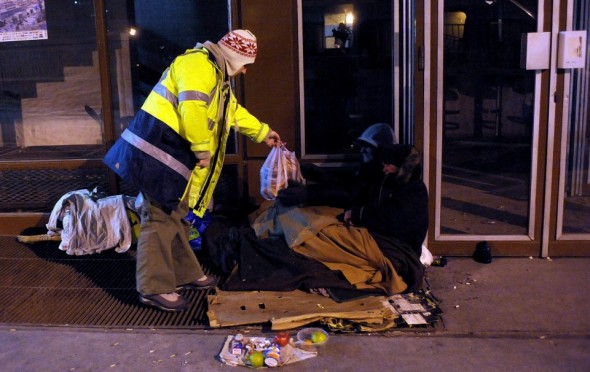April 3rd, 2013
Two United Nations Special Rapporteurs on extreme poverty and on adequate housing criticized today a recent amendment to the Hungarian Fundamental Law that authorizes national and municipal legislation to outlaw sleeping in public spaces.
The human rights experts urged the Hungarian Government to retract this newly adopted amendment, in line with the Constitutional Court’s decision to decriminalize homelessness and Hungary’s international obligations, and expressed their concern about a “rushed amendment process, which left no time for public consultation.”
“Through this amendment, the Hungarian Parliament institutionalizes the criminalization of homelessness and enshrines discrimination against and stigmatization of homeless persons in the Constitution,” said the Special Rapporteur on extreme poverty and human rights, Magdalena Sepúlveda.
“Such legislation will have a disproportionate impact on persons living in poverty in general and on homeless persons in particular,” Ms. Sepúlveda said. “This will not only impede the enjoyment of human rights of homeless persons, but will also promote prejudice towards people living in poverty and homeless persons for generations to come.”
The Special Rapporteur on adequate housing, Raquel Rolnik, warned that “outlawing rough sleeping in the context of limited availability of housing solutions for homeless persons and low-income households is contrary to Hungary’s international human rights obligations of equality and non-discrimination.”
Ms. Rolnik noted that, according to the Hungarian Government, there are currently not enough shelters in the capital to service the existing homeless community. “Hungary does not have a National Housing Strategy or a long term homeless plan for the almost 30,000 homeless persons living in the country,” she added.
“Although I welcome the additional amendments to the Constitution which recognize the right to adequate housing and a commitment to provide access to housing for every homeless person, the full realization of the right to adequate housing is far from a reality in Hungary,” the expert said.
“We are particularly concerned that this amendment aims to circumvent the decision taken by the Hungarian Constitutional Court in November 2012, which annulled previous legislation that criminalized habitual living in public spaces,” the experts stressed. The legislation was deemed by the Constitutional Court as contradictory to the Fundamental Law requirements for legal certainty and the protection of the right to human dignity and the right to property.
The Special Rapporteur on extreme poverty recalled that the previous legislation reportedly led to more than USD 125,000 in fines being levied by different municipalities on homeless persons, before it was struck down by the Constitutional Court.
“It begs the question as to how the poorest and most marginalized in Hungarian society are expected to pay these substantial fines, which only serve to push them deeper into poverty,” she stressed.
——- ENDS
Magdalena Sepúlveda is the Special Rapporteur on extreme poverty and human rights since May 2008. She is independent from any government or organization. Learn more, click here. In October 2011, Ms. Sepúlveda presented a report to the UN General Assembly on the penalization of people living in poverty: read it here.
Raquel Rolnik was appointed as Special Rapporteur on adequate housing as a component of the right to an adequate standard of living, and on the right to non-discrimination in this context by the UN Human Rights Council, in May 2008. As Special Rapporteur, she is independent from any government or organization and serves in her individual capacity. An architect and urban planner, Ms. Rolnik has extensive experience in the area of housing and urban policies. Learn more here.
Read here the experts’ previous statement on the decision of the Hungarian Constitutional Court in November 2012.
Click here to read the Hungarian Government’s response.
Source: OHCHR


Leave a Reply